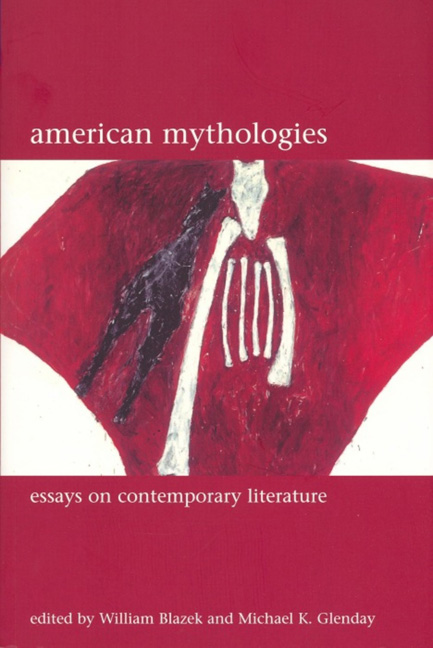Book contents
- Frontmatter
- Dedication
- Contents
- Acknowledgements
- Introduction
- 1 Indians with Voices: Revisiting Savagism and Civilization
- 2 Wild Hope: Love, Money and Mythic Identity in the Novels of Louise Erdrich
- 3 Float Like a Butterfly, Sting Like a Bee: Mythologies of Representation in Selected Writings on Boxing by Norman Mailer
- 4 The Secret Sharing: Myth and Memory in the Writing of Jayne Anne Phillips
- 5 The Individual's Ghost: Towards a New Mythology of the Postmodern
- 6 ‘Cheap, On Sale, American Dream': Contemporary Asian American Women Writers’ Responses to American Success Mythologies
- 7 ‘No Way Back Forever’: American Western Myth in Cormac McCarthy's Border Trilogy
- 8 Native American Visions of Apocalypse: Prophecy and Protest in the Fiction of Leslie Marmon Silko and Gerald Vizenor
- 9 The Brave New World of Computing in Post-war American Science Fiction
- 10 Mythologies of ‘Ecstatic immersion’: America, The Poem and the Ethics of Lyric in Jorie Graham and Lisa Jarnot
- 11 Whose Myth is it Anyway? Coyote in the Poetry of Gary Snyder and Simon J. Ortiz
- 12 Aging, Anxious and Apocalyptic: Baseball's Myths for the Millennium
- 13 Finding a Voice, Telling a Story: Constructing Communal Identity in Contemporary American Women's Writing
- Notes on Contributors
- Index
4 - The Secret Sharing: Myth and Memory in the Writing of Jayne Anne Phillips
- Frontmatter
- Dedication
- Contents
- Acknowledgements
- Introduction
- 1 Indians with Voices: Revisiting Savagism and Civilization
- 2 Wild Hope: Love, Money and Mythic Identity in the Novels of Louise Erdrich
- 3 Float Like a Butterfly, Sting Like a Bee: Mythologies of Representation in Selected Writings on Boxing by Norman Mailer
- 4 The Secret Sharing: Myth and Memory in the Writing of Jayne Anne Phillips
- 5 The Individual's Ghost: Towards a New Mythology of the Postmodern
- 6 ‘Cheap, On Sale, American Dream': Contemporary Asian American Women Writers’ Responses to American Success Mythologies
- 7 ‘No Way Back Forever’: American Western Myth in Cormac McCarthy's Border Trilogy
- 8 Native American Visions of Apocalypse: Prophecy and Protest in the Fiction of Leslie Marmon Silko and Gerald Vizenor
- 9 The Brave New World of Computing in Post-war American Science Fiction
- 10 Mythologies of ‘Ecstatic immersion’: America, The Poem and the Ethics of Lyric in Jorie Graham and Lisa Jarnot
- 11 Whose Myth is it Anyway? Coyote in the Poetry of Gary Snyder and Simon J. Ortiz
- 12 Aging, Anxious and Apocalyptic: Baseball's Myths for the Millennium
- 13 Finding a Voice, Telling a Story: Constructing Communal Identity in Contemporary American Women's Writing
- Notes on Contributors
- Index
Summary
In the opening chapter of his study of American myth, Jeffrey D. Mason accepts that America's foundation myth of itself as a space of limitless promise, of agrarian plenitude evolving into material abundance, was one which could neither survive its own internal contradictions, nor its trial by the actualities of time's passage:
There is a certain beauty in this myth, but as a guiding paradigm it no longer satisfies, and it does not express the profound failure of the American experience. Even as early as the nineteenth century, the actual Americans found that the land denied the myth's abundant promise and that the disappointment led to … an excruciating sense of frustration. The experience challenges the myth's essential optimism … [and] addresses, principally, the white, English, and mostly male experience. (21)
In more recent years, the Vietnam war has led to ‘the destruction, not of [America], but of the myth that gave it life and in which [Americans] once believed’ (Roth 349). This was the central thesis informing John Hellmann's study, American Myth and the Legacy of Vietnam (1986). Yet Hellmann also considered the afterlife of that destroyed mythology, asking perhaps the most fundamental question raised by the defeat of American myth in Vietnam: ‘what possibilities may remain for the aspiring American hero separated in Vietnam from the ideal self-concept of his culture?’ (161). He concluded that the most important Vietnam works ‘that have been most widely received as important literature have been less interested in a sustained portrait of the war than in an exploration of its implications for American myth’ (167). Published in 1986, Hellmann's conclusion could only be tentatively optimistic with regard to the rebirth of American myth. Yet in the years since, a good deal of American fiction that has the war as subject suggests instead a confident determination to move beyond such impoverishment towards what Marc Chénetier has recognized to be a widespread ‘revision of myth in contemporary [American] fiction’ (164).
- Type
- Chapter
- Information
- American MythologiesNew Essays on Contemporary Literature, pp. 63 - 78Publisher: Liverpool University PressPrint publication year: 2005

